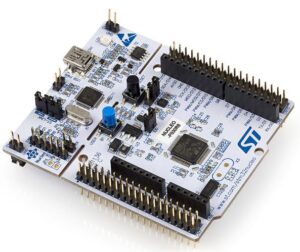A smart feedback polling system from the Indian startup Gaia Smart Cities will be one of the partner demos at our booth at electronica India, in Greater Noida, from September 25 to 27, 2019. Gaia deployed about 4,000 smart feedback systems in 33 airports and more than 100 cities. Even the Indian government adopted it as part of their Swachh Bharat Mission, a national campaign to improve the cleanliness of communities and infrastructure. All in all, the startup has already processed over 75 million responses.
The machine itself uses an STM32F0 to collect people’s feedback. Users press a button that matches their sentiment about a public place after experiencing its cleanliness, queues, services, food courts, customer service, and more. The system relays the information to a cloud platform that offers analytical tools. The initiative is also highly symbolic because Gaia Smart Cities is the first successful startup to come out of STartUP Labs, our incubator program in India.
The Birth of Gaia’s System: An ST Design from the Ground Up

The polling system uses an STM32F051C6. Running at 48 MHz, its Cortex®-M0 microcontroller offers the computational throughput necessary to collect feedback and send it to the cloud while its low power consumption and a 0.7 µA Standby mode can enable devices to last a long time in the field without having to replace batteries. The team is also using SensorTile (STEVAL-STLKT01V1) and BlueCoin (STEVAL-BCNKT01V1) as it works on integrating machine learning features in its upcoming generations of products. Since our X-CUBE-AI expansion pack, which helps convert neural network into optimized code for STM32, is compatible with the STM32L4 integrated into these two platforms, Gaia Smart Cities already has software solutions to assist its engineers in the next step of their project.
The polling system is impressive because the final design was born out of our development boards. The startup used a NUCLEO-F401RE and our previously available X-NUCLEO-IDW01M1 to test the collection of information and its transmission to a cloud. Gaia also looked at the STM32CubeF4 to better understand how to implement Firmware Over-the-Air updates. They reused some of our source code to fit and our X-NULCEO-EEPRMA1, which stores the existing firmware onto an EEPROM as a backup in case of FOTA failure. The version they will soon deploy works with an STM32F0 and an LTE modem.
Hence, despite its meager power consumption, the polling system can communicate with its cloud and receive updates regardless of its geographical location. By starting with our boards and source codes, the engineers were able to save time and focus on creating a reliable system that the Indian population can trust as it communicates its feedback.
The Rise of Gaia: A STartUP Labs Success Story
Gaia Smart Cities is also dear to ST’s heart because it is the first startup to come out of its STartUP Labs. The initiative incubates small teams and gives them a workspace within ST’s office in Greater Noida to enable them to interact with our employees, get access to some of our equipment, and benefit from our expertise. Once Gaia Smart Cities finished designing its first schematic and layout, ST experts held a design review with Gaia’s engineers to spot potential issues and assist them in the production of the early PCBs. The STartUP Labs enables ST to share its expertise and help more companies take part in the startup revolution that is sweeping India. Gaia is already working on a new project around home automation, and it is using our SensorTile and BlueCoins modules as well as Bluetooth mesh technologies during this new prototyping phase.
STartUP Labs enables us to shine a light on Indian tech startups. The country is famous for its software and technical support companies, but they can sometimes overshadow the impressive work of the country’s electronics engineers. ST is currently incubating five companies, and we are also seeing a rise in Venture Capitalist funding for hardware startups as well as significant innovations, all of which lead some to talk about a “Hardware Renaissance” in India. The STartUP Labs initiative wants to capitalize on it by enabling more startups to get access to tools and expertise. Thanks to STartUP Labs, Gaia Smart Cities rapidly deployed their feedback polling system to hundreds of cities and thanks to our worldwide network, Gaia is studying the possibility of bringing their solution to Europe.
